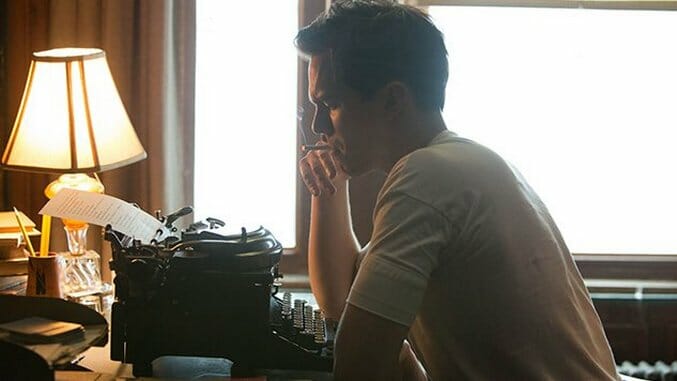Rebel in the Rye

J. D. Salinger loved stubbornness—there was something inherently noble and sincere about it. He embraced his stubborn nature when fighting against a film adaptation of The Catcher in the Rye, thinking the novel’s first-person storytelling would fall flat when corrupted into a voiceover. Now that Rebel in the Rye has adapted Salinger’s life—upon which some of the novel was based—rather than any of his works, it’s clear he was right to be stubborn.
Biopics are hard to get right. They depend almost entirely on the excitement of the subject’s life and the film’s willingness to curtail its scope to best fit this excitement. Throughout all this, whether a biopic’s subject was exciting for a day or for a lifetime, that subject must appear as much a real person as possible. It’s easier, directors would have you believe, to accomplish this if you show an entire life rather than just the fun bits, because creating a soulless highlight reel is much simpler than crafting a humanizing story out of a moment. In Rebel in the Rye, his directorial debut, writer Danny Strong makes his highlight reel one not just of Salinger milestones, but of bad biopic no-nos.
Aside from the connective voiceover that cripples the character of Salinger (Nicholas Hoult) just as the real Salinger predicted it would cripple Holden Caulfield, Strong’s film obeys an illogical structure warped in an attempt to generate drama. Opening with a post-war Salinger institutionalized for combat stress reaction, unsure if he will be able to write again for his agent (Sarah Paulson), the film then flashes back to his childhood. This seems to imply that we’ll gain some vast understanding of the journey up to his hospitalization, hoping the question of “how did he get here?” will keep attentions rapt. Instead, the same shots are used over again as the film catches up to, then continues on from, the present. There’s no meaning behind it, no reveal or dramatic punch. The script could have started at the beginning, but in keeping with the ego-fueled ethos of the film, it seems determined that only amateur scripts would bother with something so banal as starting with the start.
-

-

-

-

-

-

-

-

-

-

-

-

-

-

-

-

-

-

-

-

-

-

-

-

-

-

-

-

-

-

-

-

-

-

-

-

-

-

-

-








































